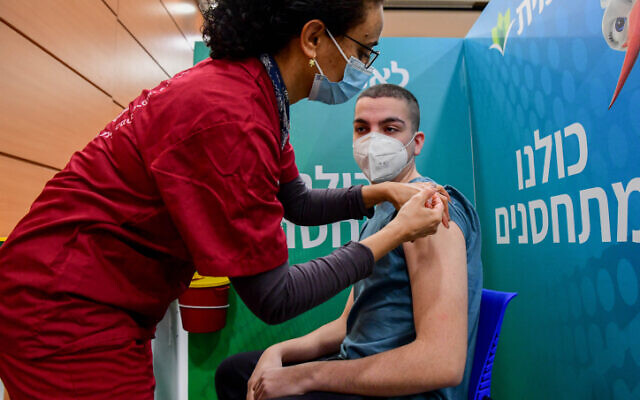Vaccinated Israelis who go on to contract the coronavirus experience it more mildly but can still suffer from so-called “long COVID” in signifiant numbers, a study published Wednesday suggests.
Sheba Medical Center monitored 1,497 fully vaccinated health workers after they received their second shot.
Its new findings on the 39 “breakthrough” infections among the health workers contracted within three months of their second shot were published in the New England Journal of Medicine.
“We found mostly a very mild infection,” said the lead author, Sheba Infectious Disease Epidemiology Unit director Gili Regev-Yochay in a Wednesday press briefing. She stressed that she considers the number of breakthrough infections to be low, highlighting high vaccine effectiveness.
“About 33% were totally symptomatic and then another 10% had very mild negligible disease with just a runny nose or something like that. Only 4% of people had fever, so altogether it was very mild.
“But I have to say that nearly 20% had persistent symptoms for over 6 weeks, what we call ‘long COVID.’ Some had loss of taste or smell, others had severe fatigue, a few couldn’t come back to work after six weeks, which I would say raises concern,” Regev-Yochay said.
Regev-Yochay noted that the research preceded the arrival of the now-dominant Delta variant in Israel but argued that the findings are still relevant in highlighting general patterns among vaccinated populations.

Illustrative: An Israeli student receives a COVID-19 vaccine injection at a Leumit vaccination center in Tel Aviv, on January 23, 2021, just after the country rolled out inoculation to everyone aged 16-plus. (Avshalom Sassoni/Flash90)
Another element of the research may help policymakers solve the conundrum of if and when to start widely distributing third doses of the vaccine, and which demographics should be prioritized if necessary.
Doctors have been unsure whether antibody levels are a clear indicator of reinfection risk, as other aspects of the immune reaction may prove more important. But the Sheba research suggests a strong correlation between antibodies and vulnerability to infection.
“The people who [were] infected had, on average, three times lower neutralizing antibodies just before they were infected than others,” said Regev. “And if we look at the peak time when the titers [antibody concentrations] were the highest, their titers were seven times lower compared to those who didn’t get infected.”
She suggested that serological testing to determine antibody levels among different demographics will help authorities assess who needs booster shots and when.
Regev said her research also indicates that antibody levels are a good indicator of the chances that a vaccinated individual who subsequently contracts the coronavirus will infect others.
“The correlation there was very strong, so people who had higher neutralizing antibodies had higher viral loads,” she added.
Article From & Read More ( Study: 20% of vaccinated health workers who test positive suffer from long COVID - The Times of Israel )https://ift.tt/3rFTf92
Health
Bagikan Berita Ini














0 Response to "Study: 20% of vaccinated health workers who test positive suffer from long COVID - The Times of Israel"
Post a Comment